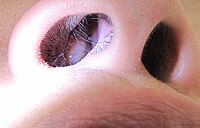
Photo from wikipedia
INTRODUCTION Chronic rhinosinusitis is currently classified into two types: chronic rhinosinusitis without nasal polyps and chronic rhinosinusitis with nasal polyps. In the West, approximately 80% of chronic rhinosinusitis with nasal… Click to show full abstract
INTRODUCTION Chronic rhinosinusitis is currently classified into two types: chronic rhinosinusitis without nasal polyps and chronic rhinosinusitis with nasal polyps. In the West, approximately 80% of chronic rhinosinusitis with nasal polyps cases are characterized by a predominantly eosinophilic cell infiltrate and a Th2 cytokine pattern. OBJECTIVE To evaluate the effect of Interferon-α on cytokine levels of the eosinophilic nasal polyp cell culture supernatant. METHODS Cell cultures were performed based on nasal polypoid tissue samples collected from 13 patients with eosinophilic chronic rhinosinusitis with nasal polyps. Polyps were considered eosinophilic according to the histopathological examination. Cell cultures were stimulated with 3000 IU of interferon-α. Before and after the stimulus, concentrations of Interferon-γ, tumor necrosis factor αand IL 2, 4, 6 and 10, using cytometric bead array, were assessed. RESULTS Cell samples from eosinophilic nasal polyps from 13 patients were included in the study. Twenty-four hours after interferon-α stimulation, eosinophilic nasal polyp culture supernatants showed significantly decreased IL-4 concentrations and increase in interferon-γ, IL-10 and IL-6 concentrations compared to controls. There were no significant differences in tumor necrosis factor -α and IL-2 concentrations. CONCLUSION We demonstrated that interferon-α in vitro alters the pattern of cytokines in cell cultures of eosinophilic nasal polyps. Analysis of these alterations suggests that interferon-α promotes a rebalancing of inflammatory profiles in cell cultures, favoring the expression of Th1 and regulatory cytokines over Th2 cytokines.
Journal Title: Brazilian journal of otorhinolaryngology
Year Published: 2019
Link to full text (if available)
Share on Social Media: Sign Up to like & get
recommendations!